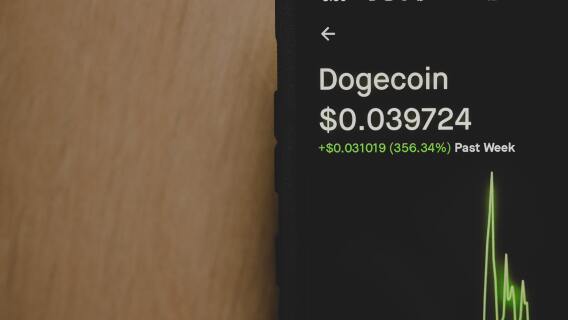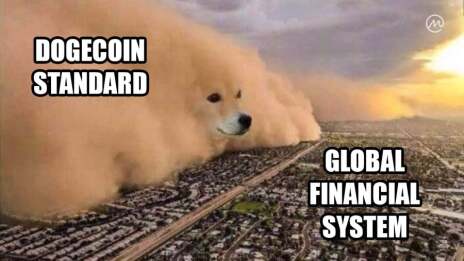What is Dogecoin? It’s a joke, and it could make you rich. Or it might just be a fun and whimsical investment.
Aside from just another cryptocurrency, what is Dogecoin (DOGE)? There’s no way to answer that without sharing a short history lesson about cryptocurrency and internet culture.
Even if you don’t follow cryptocurrency news, you’ve probably heard of Bitcoin (BTC). It wasn’t the first cryptocurrency, but it was the first to make a name for itself. It made its way to the public in 2009, and the first Bitcoin trade was in 2010. The story is that someone traded two Bitcoins for a pizza. Hopefully, it was a really good pizza. The appeal of Bitcoin was that the currency was outside the traditional financial system, so you could spend anonymously.
Since then, the cryptocurrency world has grown immensely. Investopedia reports that as of January 2021, there are over 4,000 cryptocurrencies in existence. Many of them, like Bitcoin, are decentralized and run on blockchain technology. And some of them, such as Ethereum (ETH), Litecoin (LTC), and Tether (USDT), have large market caps and potential “real world” value.
Now to switch to the Internet and memes for a moment. A meme, in popular parlance, is a term initially coined by Richard Dawkins in his 1976 book, The Selfish Gene. The Merriam-Webster Dictionary defines a meme as “an idea...that spreads from person to person within a culture.” For our purposes here, that culture is the Internet. Think LOLCats or Grumpy Cat or maybe this:
Enter ... Dogecoin.
[text_ad]
What is Dogecoin: The origins of a crypto coin
First, how the heck do you pronounce it? Long o, soft g, silent e. “Doh-j-coin.”
Dogecoin literally began as a meme in 2013. Software engineers Billy Markus and Jackson Palmer created it as a sarcastic response to the Bitcoin speculation. Combine that with the popular Shiba Inu meme, add in a Reddit community, stir for a few years, and you have a cryptocurrency that is quickly gaining popularity.
One Dogecoin investor we spoke with says that he appreciated the fun, silly nature of the Dogecoin community when he got involved in 2014. He also mentioned that the goal from the beginning was to make Dogecoin a legitimate currency. The idea was that you could walk into your favorite fast-food restaurant and buy a burger or maybe even buy a car.
But what is Dogecoin doing that makes it so popular?
Whether it’s an accurate assessment or not, there’s a certain amount of perceived rebelliousness with investments like this. For one thing, it’s very affordable, and it offers a way for lower-income investors to potentially make big bucks. For example, Dogecoin was trading for less than a penny in January of 2021. It was at six cents by early April, and by the end of the month, it was up to 33 cents. Then Elon Musk, a fan of Dogecoin, went on Saturday Night Live. In the lead-up to the show, Dogecoin jumped to 75 cents.
So while not every investor can afford to buy enough $50 stocks to make a considerable profit, $50 invested in Dogecoin at the beginning of 2021 was worth something in the range of $6,000 by early May, depending on exactly when you bought or sold it. That’s not a bad ROI!
That’s certainly reason enough to appreciate any investment. Cryptocurrency is, however, notoriously volatile. And Dogecoin is no different. Shortly after the SNL appearance, Dogecoin dropped by over 50%. Why? Well, that’s investing - people made a profit in a short time and then they sold. But just as he had a hand in Dogecoin’s rise, Musk played a role in its subsequent decline after stating that Tesla (TSLA) would stop accepting another cryptocurrency, Bitcoin, as payment because of the environmental cost of mining (more on that in a moment), which played into it. But then he asked whether people wanted him to accept Doge, and Twitter went wild.
Still, Dogecoin does have other well-known supporters, such as Dallas Mavericks owner Mark Cuban and rapper Snoop Dogg. Cuban Tweeted that the Mavericks would “continue to accept BTC/Eth/Doge because we know that replacing Gold as a store of value will help the environment ...and... shrinking big bank and coin usage will benefit society and the environment.”
Where does Dogecoin (or any cryptocurrency) come from?
Cryptocurrencies are entirely digital or virtual. As a form of payment, they are, theoretically, portable across borders, transparent, resistant to inflation, and more secure than cash. They go around third-party institutions like banks and credit card companies. They’re also well-liked for the private nature of the transactions. And while that can lead to illicit activities, it can also offer privacy to people living in countries with oppressive governments.
These digital coins and currencies come from highly complex “guesswork,” known as mining. Investopedia describes it like this: “You may have heard that miners are solving difficult mathematical problems—that’s not exactly true. What they’re actually doing is trying to be the first miner to come up with a 64-digit hexadecimal number (a “hash”) that is less than or equal to the target hash.”
Obviously, that requires significant computing power, hence the environmental impact. And the catch is that you have to be the first to reach and verify that number. The reward is that you get paid in cryptocurrency.
Different cryptocurrencies have different specifics, but that’s the basic premise for most of them. The other part of this is the number of coins available. Bitcoin, for instance, has a cap of 21 million coins, and there are currently close to 19 million in circulation (or in wallets, which we’ll also get to in a moment). Dogecoin, on the other hand, does not have a cap on how many can be mined, but there is a limit of 5 billion coins that can go into circulation each year.
How can you buy or invest in Dogecoin?
Like most cryptocurrencies, you can buy Dogecoin through online exchanges. You may have to findinvesting apps or organizations that support cryptocurrency, and some of them only support specific cryptocurrencies. SoFi, for example, only supports Bitcoin, Ethereum, and Litecoin. Robinhood and Webull have more options, but there’s a catch.
With Webull, it doesn’t look like you can transfer that crypto out of your account without liquidating it. So it acts more like a stock, in that you can buy and sell Dogecoin, but you can’t use your Dogecoin to purchase tickets to see the Mavericks.
And we have to mention Robinhood as a warning. Just as they halted trading in GameStop (GME) in January 2021, they also halted Dogecoin trading when the coin was surging in mid-April. The company claims it was a system failure rather than an administrative decision. Still, we’d probably skip Robinhood as an exchange and stick with something more secure and reliable.
So once you buy Dogecoin, or any other cryptocurrency, how do you use or hold it? Again, if you want it as an investment, you may be fine with keeping it in an account with your broker. However, if you’re going to spend or trade your coins, you’ll need a wallet.
There are a variety of wallets out there, with, as you can imagine, all sorts of pros and cons. With Dogecoin, you can download a wallet right from their website. “You have to sync with the blockchain to use Dogecoin. MultiDoge is a ‘light’ wallet. It syncs with the blockchain by ‘skimming’ through the blockchain, providing fast sync times. Dogecoin Core, on the other hand, is a ‘full’ wallet. It syncs by downloading it, providing a solid-working Dogecoin wallet.”
What’s next for Dogecoin? Fans want to take Dogecoin “to the moon,” and there’s a good chance that will happen. Literally. Space X is planning a launch of the DOGE-1 satellite to “obtain lunar-spatial intelligence.” The plan is to pay for the launch entirely in Dogecoin. Whether that happens or not remains to be seen.
Here on earth, however, the Dogecoin community’s next goal is to get Dogecoin to one dollar. Is it worth investing in? We’ll leave that for you to decide, but at its current price, maybe it’s a good way to jump into something highly speculative and have some fun without risking too much money. Or not.
What are your thoughts on Dogecoin and other cryptocurrencies? Do you hold any in your portfolio? Share your thoughts in the comments.


